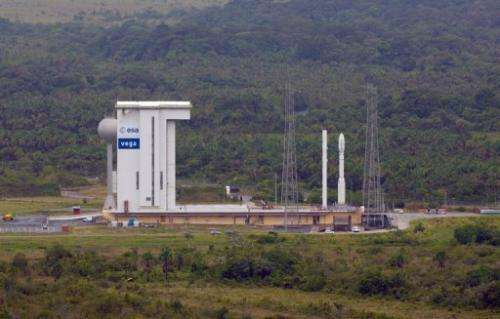European Space Agency picture shows the Vega rocket on its launch pad at the Kourou Space Centre, French Guiana, prior to its maiden flight last year. The launch Saturday of Europe's lightweight rocket from Kourou was put off until an unspecified date because of poor weather conditions at the space base, the European Space Agency said.
The launch Saturday of Europe's lightweight rocket, Vega, from Kourou in French Guiana was put off until an unspecified date because of poor weather conditions at the space base, the European Space Agency said.
The rocket's first mission since its maiden flight in February last year was to have been webcast live.
"The weather conditions being unfavourable over the Guiana Space Center in Kourou, the European Space Agency (ESA) and Arianespace have decided to postpone" the mission, ESA said in a statement.
"Another launch date will be decided depending on the evolution of the weather conditions in Kourou."
The rocket is to carry two small Earth-observation satellites and a microsatellite.
According to the European Space Agency, the 140-kilo (300-pound) Proba-V satellite is designed to map vegetation cover as an aid to monitor crops and predict famines.
The 115-kg (250-pound) VNREDSat-1 was designed as a climate-monitoring tool for Vietnam's academy of science and technologies.
The third item of the payload is a 1.3-kilo (2.86-pound) Estonian microsatellite, ESTCube-1, that will test an electric solar sail—a passive form of spacecraft propulsion in which the drive comes from particles blasted out by the Sun.
Vega carried out its first flight on February 13, 2012—culminating a more than 12-year quest by the ESA to complete a range of space launchers that covers all categories of payloads.
The 30-metre (100-feet) launcher is designed to hoist multiple payloads, ranging from 300 kg (660 pounds) to 2.5 tonnes, into orbits ranging from 300 to 1,500 kilometres (190-940 miles) from Earth, depending on their mass.
The rocket cost 776 million euros, or just over a billion dollars, to develop.
© 2013 AFP
























